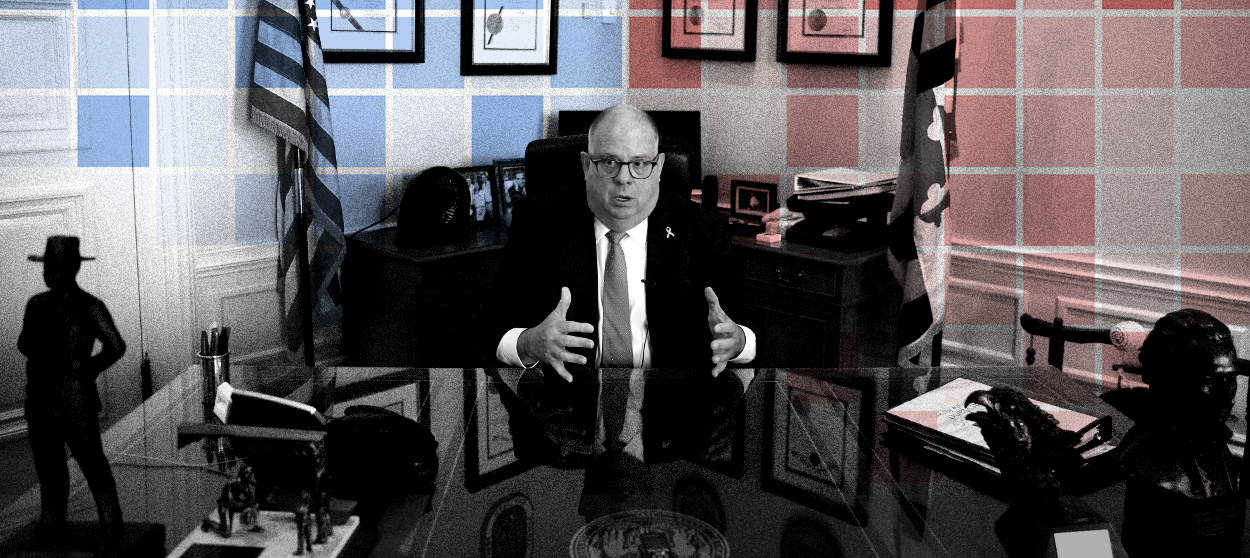The lessons of Larry Hogan
Maybe it pays to be a RINO, after all


A free daily email with the biggest news stories of the day – and the best features from TheWeek.com
You are now subscribed
Your newsletter sign-up was successful
A GOP governor in the ultra-blue state of Maryland is poised to win re-election next week — and in all likelihood it won't even be close.
A GOP governor in the ultra-blue state of Massachusetts is also poised to win re-election next week — and it all likelihood it won't even be close.
In neighboring Vermont — land of Bernie Sanders and Howard Dean! — an incumbent Republican governor is also comfortably ahead of his Democratic challenger.
The Week
Escape your echo chamber. Get the facts behind the news, plus analysis from multiple perspectives.

Sign up for The Week's Free Newsletters
From our morning news briefing to a weekly Good News Newsletter, get the best of The Week delivered directly to your inbox.
From our morning news briefing to a weekly Good News Newsletter, get the best of The Week delivered directly to your inbox.
Finally, a GOP candidate is within striking distance of winning the governor's race in reliably blue Oregon. In all likelihood, it will be close.
What are Larry Hogan, Charlie Baker, Phil Scott, and Knute Buehler doing right? How are these Republicans surviving, even thriving, amid an anti-Trump blue wave of uncertain magnitude?
Before we get to all that, let me set the table by reiterating my longstanding beef with the "purple" politics (fiscally conservative, socially inclusive) of the business elite — because I know that's exactly what you're thinking these Republicans are doing right. Yet outside of Wall Street, Washington, D.C., and Silicon Valley, the actual constituency for purple politics is a lot smaller than it seems. Wall Street, Washington, and Silicon Valley have a lot of money, ample access to the media, and, thus, a very loud megaphone.
So what gives? Does the seeming success of Baker, Buehler, Scott, and Hogan suggest that purple politics has a real future after all?
A free daily email with the biggest news stories of the day – and the best features from TheWeek.com
If you're excited by this prospect, I have some bad news: You have to squint pretty damn hard to see the "fiscally conservative" half of these paladins of purple. Indeed, these Republicans look a lot like Democrats.
Back in April, the editors of the Baltimore Sun chortled at Hogan's astonishingly successful partisan makeover in all but party identification:
During the General Assembly session that ended Monday night, Maryland's governor supported legislation that will result in more than $700 million in tax increases. Part of it, he backed as essential to protecting ObamaCare; much of the rest is being set aside for a down payment on what's expected to be a big increase in education funding next year. The governor battled the Trump administration on clean cars and dirty power plants, supported three significant gun control measures, and allowed bills to become law that establish automatic voter registration, protect LGBT youth, and support public sector unions.It was, all around, an excellent session for Martin O'Malley.Wait, what's that you say? He's not governor anymore? It's Larry Hogan? [Baltimore Sun]
In Massachusetts, the story is much the same. Joshua Miller writes in The Boston Globe, in a nearly identical tone of bait-and-switch irony:
He has signed a bill boosting the minimum wage to one of the highest in the nation and creating a paid leave program by raising taxes — and still others strengthening gun control, reforming the criminal justice system, enshrining protections for pregnant workers, defending transgender people from discrimination, and ensuring free access to birth control.This week, he's posed to put a law on the books securing a woman's right to choose an abortion in case Roe v. Wade gets overturned.Such a record would be pretty good fodder for a Democrat running for office.But all these measures were signed by Gov. Charlie Baker, a Republican who is facing re-election with a record built in part on the policy priorities championed by the Democrat-controlled Legislature. [The Boston Globe]
In Oregon, the record is a bit more muddled. Buehler, an affable orthopedic surgeon originally from the Midwest, is pro-choice and pro-gay rights, but is wishy-washy on ObamaCare, guns, and environmental issues. Yet it's important to note that the Oregon gubernatorial race is turning mostly on local issues like homelessness and education funding. In Vermont, Gov. Scott glumly succumbed to tax increases in the last state budget and approved restrictive new gun laws. Of our four exemplars of purple, Buehler and Scott are most deftly threading the ideological needle in a way that close observers of national politics might recognize.
Is there anything to be gleaned from these races? Do they point a toward a Republican politics that doesn't require a devil's bargain with the forces of white ethnonationalism? Most Republicans on the ground would tell you no. They will tell you that, in local and state races, rank-and-file GOP voters understand the different contexts and adjust their ideological demands accordingly. They will tell you that blue-state GOP governors have distanced themselves from President Trump in a way that Republicans in other states simply cannot. They will tell you that, obviously, Republicans can win national elections without winning Oregon, Maryland, Massachusetts, and Vermont.
But Democrats are surging anew in the Midwest, potentially signaling that the gains Trump made there might be erased in 2020. They are making inroads in deep-red Tennessee while embracing gun rights and Brett Kavanaugh, yes, but also while opposing Republican fealty to corporations and its obsession with repealing ObamaCare. Without his Rust Belt crossovers, Trump is likely toast. And so Republicans will be left with a choice: Will they finally concede that their plutocratic positions on taxes, spending, and health care are unpopular as hell? Or will they double down on the race-baiting, like they are right now?
After next week's midterm election, it's very likely that the Republicans left standing will be the most stalwart Trumpists. Except for our blue-state outliers underneath the national radar. Their success, if it comes to pass, will owe not to their straddling a just-so purple line between fiscal conservatism and social inclusiveness. It will come because, on economics, blue is simply more popular.
Scott Galupo is a freelance writer living in Virginia. In addition to The Week, he blogs for U.S. News and reviews live music for The Washington Post. He was formerly a senior contributor to the American Conservative and staff writer for The Washington Times. He was also an aide to Rep. John Boehner. He lives with his wife and two children and writes about politics to support his guitar habit.
-
 Switzerland could vote to cap its population
Switzerland could vote to cap its populationUnder the Radar Swiss People’s Party proposes referendum on radical anti-immigration measure to limit residents to 10 million
-
 Political cartoons for February 15
Political cartoons for February 15Cartoons Sunday's political cartoons include political ventriloquism, Europe in the middle, and more
-
 The broken water companies failing England and Wales
The broken water companies failing England and WalesExplainer With rising bills, deteriorating river health and a lack of investment, regulators face an uphill battle to stabilise the industry
-
 The billionaires’ wealth tax: a catastrophe for California?
The billionaires’ wealth tax: a catastrophe for California?Talking Point Peter Thiel and Larry Page preparing to change state residency
-
 Bari Weiss’ ‘60 Minutes’ scandal is about more than one report
Bari Weiss’ ‘60 Minutes’ scandal is about more than one reportIN THE SPOTLIGHT By blocking an approved segment on a controversial prison holding US deportees in El Salvador, the editor-in-chief of CBS News has become the main story
-
 Has Zohran Mamdani shown the Democrats how to win again?
Has Zohran Mamdani shown the Democrats how to win again?Today’s Big Question New York City mayoral election touted as victory for left-wing populists but moderate centrist wins elsewhere present more complex path for Democratic Party
-
 Millions turn out for anti-Trump ‘No Kings’ rallies
Millions turn out for anti-Trump ‘No Kings’ ralliesSpeed Read An estimated 7 million people participated, 2 million more than at the first ‘No Kings’ protest in June
-
 Ghislaine Maxwell: angling for a Trump pardon
Ghislaine Maxwell: angling for a Trump pardonTalking Point Convicted sex trafficker's testimony could shed new light on president's links to Jeffrey Epstein
-
 The last words and final moments of 40 presidents
The last words and final moments of 40 presidentsThe Explainer Some are eloquent quotes worthy of the holders of the highest office in the nation, and others... aren't
-
 The JFK files: the truth at last?
The JFK files: the truth at last?In The Spotlight More than 64,000 previously classified documents relating the 1963 assassination of John F. Kennedy have been released by the Trump administration
-
 'Seriously, not literally': how should the world take Donald Trump?
'Seriously, not literally': how should the world take Donald Trump?Today's big question White House rhetoric and reality look likely to become increasingly blurred
